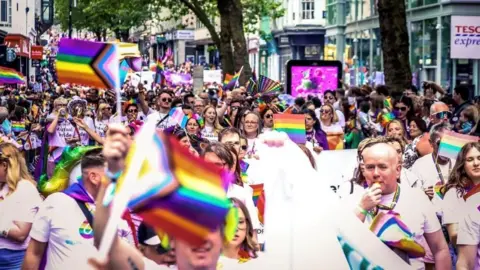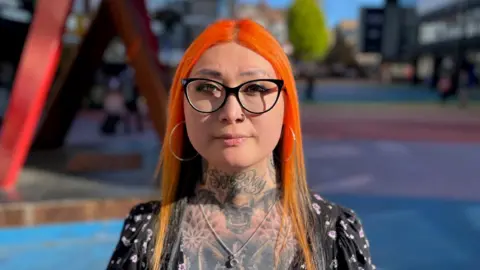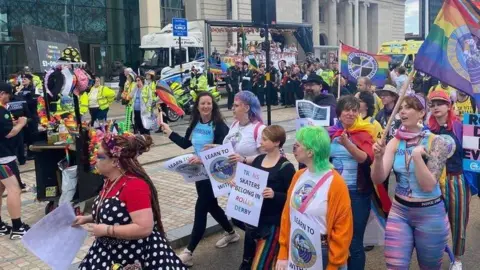Birmingham Pride in political parties parade ban
 Birmingham Pride
Birmingham PrideSome political parties have been banned from Birmingham's Pride parade, with organisers citing what they call a lack of support in the wake of a Supreme Court ruling.
Judges in the UK's top court concluded this month a woman is defined by biological sex under equalities law.
Birmingham Pride said it had "growing concerns about the role political parties have played in fuelling a climate of hostility toward trans+ individuals".
Organisers of the annual LGBT+ festival added Labour, the only party booked to march at the parade on 24 May, was being informed it cannot do so. Labour said it would "continue to protect the trans community", adding laws to protect trans people remained.
'Ignored by politicians'
Many groups, including some representing lesbians, have welcomed the Supreme Court ruling, however others have said it leaves trans people feeling "very alone".
The ruling received a mixed response from political parties.
Birmingham Pride said the parade was full and was not taking further applications, but added: "The position is clear, any political parties supportive of trans rights would be welcomed and those that don't are not."
Eva Echo, Birmingham Pride's director of innovation, said: "The trans+ community is still ignored by politicians at local and national level. For too long we've been talked over, used for political gain and forced to watch as our rights are stripped away, and our existence twisted beyond recognition."
She added: "Those who do not fully commit themselves to supporting and protecting us throughout the year, do not have a place with us during Pride, just because it suits them."
 Birmingham Pride
Birmingham PrideThe two-day festival, one of the UK's biggest LGBT+ events, said it had growing concerns over promoting "exclusionary interpretations" of the Equality Act following the Supreme Court ruling.
Interim guidance over the use of single-sex spaces, in light of the Supreme Court ruling, said trans women should not use women's facilities, but should not be left without any facilities to use.
The Supreme Court had been asked to provide clarity on the 2010 Equality Act.
A campaign group had brought the case, arguing that sex-based protections for women should only apply to those who are born female.
Ultimately the court backed that position, but in the ruling Judge Lord Hodge said the law still offered trans people protection against discrimination.
Conservative leader Kemi Badenoch described the ruling as a "victory for all of the women who faced personal abuse or lost their jobs for stating the obvious", and added that the Equality Act protects trans people from discrimination.
The Green Party has called for the guidance to be withdrawn, calling it "ill-considered and impractical".
The Liberal Democrat leader Sir Ed Davey supported the ruling but said more debate was required in parliament to ensure people's rights are respected.
Reform UK leader Nigel Farage said the ruling was an "outbreak of common sense from our judiciary."
Birmingham Pride's decision follows Belfast and Southampton pride events in excluding political parties from taking part in marches.
Birmingham Pride added it was in "active conversations" with other prides across the country to ensure "a united stance in support of trans+ rights".

Labour said everyone in society deserved "dignity and respect".
"The Supreme Court judgement gives clarity and confidence for service providers," a party spokesperson said.
"We are aware that many trans people will be worried in the wake of the ruling, and we remain clear that we will continue to protect the trans community.
"The laws to protect trans people from discrimination and harassment will remain in place, and trans people will still be protected on the basis of gender reassignment—a protected characteristic written into Labour's Equality Act."
